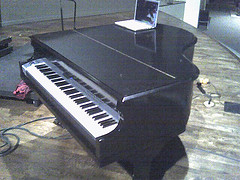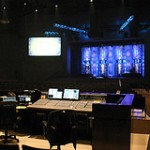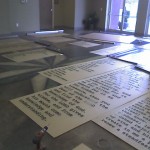
Learning to Play “the Piano”

Thanks to everyone who participated in the poll on who mixes FOH at your church; as of this posting the poll is still up if you haven’t participated, yet. It was very cool and encouraging to see that there are so many volunteers out there. In all honesty, something that I have wrestled with is whether FOH should be manned by staff or volunteers. It is a high pressure position with a lot of demands from a lot of different directions, and I get concerned about loading up volunteers wit these things. But no matter how many times the discussion might come up, we always come back to having a strong desire to place volunteers in that position. AND our volunteers are always up for the challenge.
While I have the luxury of having some amazing FOH engineers serving with us, there are still training challenges. The nature of the role of FOH engineer isn’t a paint by numbers position. While there is definitely a measurable/scientific/technical side to it, there is also a subjective artistic side to it. A common phrase that gets thrown around is that the FOH engineer is another member of the band, and I would agree that should be the case.
If the FOH engineer is a member of the band, I would have to say his instrument is the mix itself. I’d like to take this a step further and compare “the Mix” to an instrument almost too common in churches: the piano. Piano keys are sort of static in nature where there is a key for each note that can be played. The piano notes are sort of akin to the controls on a channel strip of a mix console. In both instances, it is fairly easy and uncomplicated to teach someone how to work these. Press a piano key to play a note or move the fader or turn a pot on the mix console to change the sound.
Now, if you know anything about music–and I’m assuming you do if you’re taking a stab at this thing called audio–you know that there is a whole lot more to playing the piano than just pushing a key to make a note sound. There are millions of ways that those keys can be played based on different combinations of keys coupled with the rhythmic and dynamic components of how the keys are played. That dynamic component can’t really be quantified so let’s just call this “feel”. Feel is a very subjective thing, and something that is very difficult to teach. Some might say that feel is a natural kind of thing that you either have or don’t have. If you were to sit in on a children’s piano recital, you would invariably hear different levels of feel as it pertains to playing a piano. When I was playing in bands and auditioning members we would say that they either had or didn’t have “the rock”, but we were really talking about feel. It was an almost inherent, unquantifiable thing we were looking for; some guys got it and most didn’t.
I firmly believe there is also a “feel” component when it comes to playing our instrument, the Mix, and I would say feel plays a part in just about every component of the Mix from shaping tones to blending instruments to working transitions. People with a bit of aptitude can be taught the technical side of our instrument relatively easy. There are a lot of different buttons and slider things on a console, but given a bit of time I can teach someone what each knob/button/slider does just like a piano teacher can teach what each black and white lever and pedal on a piano does. But just like the piano, it’s not a knowledge of what each button, fader, and knob does that makes what comes out of our consoles and PA’s music. In our world it’s the feel of the engineer driving the Mix that makes it sound like music. And just like playing the piano–or any instrument for that matter–there are many different levels of feel that can make the Mix sound like it was played by a master or a brand new student or someone who simply has no business mixing at all.
The reason I’m talking about this is I think the feel side of mixing is largely being ignored while we geek out over the technology. We basically “ooo” and “ahhhh” over a bunch of pianos and maybe go to a class or seminar to talk about what each key does, but there isn’t a lot of talk about how to really play the thing. I can explain all the controls on a compressor and even give some good starting points, but that doesn’t really teach someone how to use it.
But I don’t think this is completely the fault of the available training seminars and workshops, though, because feel isn’t really something that can or should be taught in these environments through a systematic approach. How many 1st chair symphony players do you think received all their training from sitting in a classroom with other violinists? I would venture to guess the answer is a big, fat ZERO.
However, the fact that there seems to be very little talk and even less resources about nurturing feel concerns me. This is a big deal to me especially when related to mixing in churches because it’s feel that makes what we do music and not just a sonic blend of stuff. And it’s the music that the listeners ultimately will connect with on the emotional level. If worship is a heart thing, I think this is what where we want to be.
So let me bring this down from 30,000 feet to my own present reality. My training challenges at FOH largely lie in the feel category. All of our FOH volunteers have feel for the Mix, and with that they all bring their own tastes and feel to the table when they mix. They are also at different levels of refinement in their ability to apply feel to a mix using the tools at hand. My challenge is figuring out a way to take these different feels, help continue to refine them, and give them a certain consistency without completely losing the personality of the engineer. Add to the challenge that unlike a musician who can take his instrument home and practice everyday, our volunteers are largely only practicing every two to three weeks.
This year I have some new things I’m going to try to really take our mixes to a different level which will in turn aid in creating a great environment where folks can meet with God. This post ran a little long which is always the case when I start to rant so I’ll get into specific ideas in the future.

 Previous Post
Previous Post Next Post
Next Post



You are so right on with this one Dave. I have long said that mixing is at LEAST 2/3 art and 1/3 science. The more I learn the more I think its more like 80/20. That sounds like an odd statement, the more I learn the more I think its art. To me its like learning to paint, one can continue to learn about the different types of canvas, paints and brushes, but the picture comes from the artist. I can teach most people what all the knobs do, and I can nurture the talent, just like any painter can get better, but in the end they must have a God given talent to mix.
Dave you just touched briefly on the age old problem that has plagued most church audio for the past 35 years. How do you teach “feel”. If you have insights and can teach it you should write a book and most likely retire with a lot of money.
Scott
There is some truth to saying mixing is a art form but if you don’t understand the technical side of things first, you will never be able to fully master the mixing end of the job. For those of us that have to travel with shows and don’t have the privilege of having a sit down house gig, (boring……J/K) knowing the technical side of the job is very important. It maybe something you should encourage your younger volunteer staff into taking a paid intern type position with a regional sound company. (I am talking more about the volunteers that want to do this type of job for a living) They will learn more about the live audio field in one summer internship, then just volunteering with there local church. I am not putting down church production here. It’s just that when you have a single installed system you work on all the time, you have no other reference point for other gear out there and the problems that arise on a moving setup. Also, your experience is one sided when you always use the same gear. The more shows you do on different setups, the more you will learn about what works and what doesn’t in a variety of setups. Also, most regional and touring sound companies will not put a intern on a console right away. At first, they will probably be doing a lot of there work pinning(cabling) the stage and setup of the stage. This may also include wireless programming and mapping. The more situations they will run into, the more complications will arise and that will force them to troubleshoot and think quick on there toes. Also, before someone moves out to FOH, they should have to master running monitors first. This will force the person to learn frequencies and also multi task as they are passing out dozens of mixes at the same time. It also gives them a good idea of how things need to sit in the mix. The more efficient you are at running monitors, the easier it will be once you do make it to FOH and have to do that difficult 2 mix.(haha) Finally, I don’t believe the FOH engineer is another member of the band, especially in the area of church sound and worship music. With certain artists that are very effect oriented, the FOH engineer could have more artistic contributions to make the live performance sound like what you would hear on the CD. But when it really comes down to it, the engineer is there to supplement the performance on the stage without getting in the way with his/her own artistic licensing. If a band is really good, it should be that much easier to make them sound good. I’ve toured with a several acts where the musicians are so tight on stage, it’s as though they are one unified sound. Everyone has there pocket and rarely do they leave that pocket. If you have a great band and your mix is able to breathe(every part/instrument has a place to sit in the mix) there is no reason you shouldn’t be able to pass the mix on to a qualified volunteer. It’s not like you are having them starting from scratch. They will for the most part be pushing faders and as long as they keep the vocal on top and they can follow the music and the movements, they should be good. (I know there are certain exceptions to that rule) Also, you have all that money wrapped up in a D show and PT recording rig…. Let your volunteers start a pre recorded rehearsal or sunday session with virtual soundcheck and have them build a mix from scratch. You will soon see who has the feel to do what you find acceptable. Just my 2 cents.
Kyle McMahon
Kyle, I’m not sure you’re completely understanding me. I’m not advocating we forget about the tech side of things. I’m saying that we overemphasize it when related to the artistic side of things.
I have to say I disagree with just about everything you’re saying, but I’ll just focus in on a couple of things related to my original post. I disagree that the tech side always needs to come first for a mixer and that’s the skill set I’m addressing in the post. Without a fundamental understanding of music and the art of it, the mix will suffer. Period. Anytime you blend a bunch of faders together, that’s art. When you carve out frequency space with an EQ so that two instruments fit in the mix, that’s art. When you adjust your compressor so the snare drum is slamming but still sounds natural, that’s art. When you nudge a keyboard or guitar fill up a bit to highlight, it’s art. When you feather that delay in at just the right time without drawing attention to the effect, it’s art. If it was purely technical, you could give an intern a set of steps, and they could achieve the same results every time. But you said it yourself; no sound company is going to stick the new guy on a console at FOH for an act, and we don’t throw inexperienced guys right out on a console, either. Because there is an art to mixing.
And I don’t necessarily agree that a background mixing monitors will help you at FOH. Musicians can have very specific needs which is a different ball game than mixing music for an audience. I have worked with guys who are fantastic at FOH, but terrible at monitors and vice-versa. Monitors can be a great skill to have, but it’s not for everybody. And I’m not sure monitors is the place to start guys, either. I think you can actually negatively impact things by having inexperience guys at monitors, especially in churches, because if the band doesn’t get what they need, they don’t play the same which affects their ability to lead a congregation in worship…
I also disagree that working with bigger touring acts means there is no art involved. I’ve worked with really tight bands, too, but if you could only see the amount of automation used when they make their records… I’m not talking big sweeping movements, it’s all subtleties and that makes it even more of an art to nail.
The guys you are mixing are great musicians(Kyle’s out with the Passion folks for those who haven’t jumped to his MySpace site), but this blog isn’t being written for folks mixing that caliber of acts. The folks reading here are working largely with volunteer musicians who almost always need the FOH guy to be an extension of the band, and that–in my opinion–is an art first, that makes use of tools we call technology. They, too, are working in a variety of different venues within their own churches(main sanctuary, youth space, kid’s space, portable rig for weddings, etc, etc, etc.) on a variety of equipment often in various states of repair often multiple nights a week. The bands can change and the music styles can change almost every time they get up to mix. These guys aren’t out with the same band night after night mixing on the same gear for several months on end.
There are obviously enormous challenges in the world of touring sound reinforcement, but I think you are putting down a lot of guys who work just as hard as you do when you try and play up touring as having more challenges and being a better place to learn. Touring is a great place to learn, but it isn’t the only place.
I have worked both in the touring world and as a full time FOH and Monitor engineer in a HOW setting. A lot of what I learned in the touring world has helped me in the church setting but I’d have to say what I’ve learned at church has made my mixing chops improve more then the road ever did. I think the reason is in the church setting I have the time to work on mixes in a more controlled environment. I can vouch that a great FOH engineer really makes doing monitors a lot easier. It took me about 2 years to convince the band guys that they should hold off making fine tune mix adjustments until the FOH engineer gets the mix dialed in. This even applies to IEM’s as well as wedges.
I agree with Dave that putting a volunteer behind a 56 channel desk with 9 stereo IEM’s and 5 wedge mixes is not the best thing to do and could potentially take a great volunteer and scare them off quickly, which is not what we want to do.
Scott
FOH is one of the toughest jobs in a church volunteer setting. If you do your job very well, the band gets tons of praise. If you don’t [or more likely] someone doesn’t like the flavor of what you’ve done, you are much more likely to be severely criticized. No other area I’ve worked in is like this.
I agree 100% with the feel aspect. I agree that you are essentially part of the band. Most bands don’t think so, though. They frequently have little to no appreciation for what FOH requires.
I think the best FOH is active. Not setting levels and leaving your hands in your lap. For most church settings, it’s more producing than pushing buttons. Up, down, in and out to set the stage audibly for where we want to end up. Adding gas when it’s necessary but laying off when it’s not.
I’ve tried training from both ends, technical first, then artistic, or artistic first, then technical. Neither works in every case. You have to start from where someone is and move them to where they need to be. Sending a volunteer at a local supply house is highly impractical. Should I ask a guy who is working a 40 hour job to work every weekend away from church to gain knowledge that he’ll use in church once he’s “paid his dues”. Better to have him ride along beside someone with the skills and learn by osmosis. Slower to be sure, but it’s not really about the job, it’s about the people doing it.
Great article by the way,
J
J- I think you made a really good point in saying that most of your volunteers don’t have all the time in the world to work on getting better at sound. Surely, we all run into some people that do, but on the other hand, sometimes people just need to start down lower.
When I train someone, I have them shadow me, and slowly start by having them help set up and tear down.
It takes time to get from there to becoming a FOH guy, but hey- it does happen!
Dave—Spot on. I also agree with J that FOH in a church is one of the toughest jobs in the church for the reasons he mentioned, and the fact that FOH is such a mix of art and science.
I really like the piano analogy. We’ve all heard piano players who play technically well, but aren’t great players. Sure, they hit the right notes at the right time, but there’s no soul to the sound. A truly great piano player can move an audience to tears because he/she feels the music.
For me, the real challenge has always been finding the people who have the appropriate mix of technical geekiness (and/or a desire to learn) and an artistic sense of what music should sound like.
I was once talking with a volunteer FOH mixer at a church some years ago. The subject of bands came up as I was at the time shooting festivals. I started rattling off the names of the bands (Newsboys, Smitty, Third Day, Audio A…) and he had never heard any of them. I asked him what kind of music he listened to. “Oh I really don’t listen to music much,” was the reply. Instantly, it was clear to me why his mixes never sounded good, though he never missed a cue.
Anyway, great post!
Great post Dave.
I’m inspired by your approach in training: shadowing, setting up, tearing down, and spending time with you. It’s more mentorship than training. We train people to do stuff that needs to get done. We mentor people to draw out talent and gifting they already have. Some great sound guys I know say things like, “when I worked with [so and so] I learned…” With church sound there’s more to know than how to (in my case) get a great, thick rock and roll sound at less than 91dB A-weighted. You have to know your audience, be caring, loving, and considerate. You get that by hanging out with someone cool.
If we view church audio as a mostly technical service position people go to classes for then we’ll miss the opportunity to mentor the next generation of gifted artists. OK, I’m off to scout out my next padawan learner. 🙂
Love this thread.
The blend of art and science pulls me to FOH like a moth to a Coleman lantern. My inner-physicist geeks out over finite impulse response, polypropylene caps, and odd vs. even harmonics. Simultaneously, I’m itching for another fix of goosebumps felt when the Holy Spirit, the congregation, the worship leader, the band, and I land on the same “1”.
Erik and I recently observed how we can no longer tell who is mixing FOH until we look behind the console. Getting eveyone dialed-in has been an iterative journey committed to some basic principles:
1. A worship leader with a well articulated vision
This starts at the top. Before I joined the sound team I asked our music pastor what his ideal sound system would do. Without hesitating, he said, “I want a system that can support what’s being sent from the stage. Everyone must hear every word our pastor says, if the band gets funky then the system should bump folks out of their seats, if the band is rockin’ then the system should blow everyone’s hair back, and if a choir is singing acapella…no one should know we’re using sound reinforcement.” See why I joined?
2. Well prepared rehearsal
Our pastor posts MP3s and charts on our website. The musicians and sound team are expected to know them before rehearsal. We learn the stuff on our time and use rehearsals to “kick it up a notch” for God.
3. Calibrated tools and standard practices
Guitarists and keyboard players work hard to gain match their patches; FOH guys work hard to optimize channel strips (a praise filled shout-out to Digidesign Venue for making this straightforward and repeatable); vocalists always grab the same color coded mic. etc.
4. Small group prayer requests, praise reports, and good times
Every week we get together and exchange prayer requests, share praise reports, and party like it’s 1999. Constructive criticism flows easily in this atmosphere.
We sound guys are treated like part of the band so we act like part of the band. Solos soar, faders follow crescendos and decrescendos, and everyone follows the pastor’s cues. When we invite the Holy Spirit to party with us he’s never disappointed for showing up.